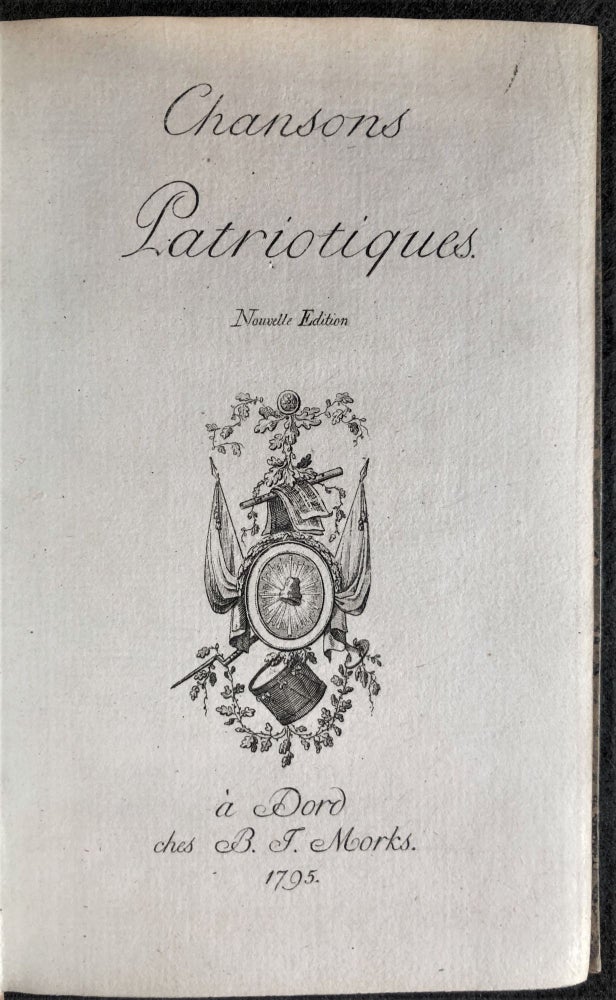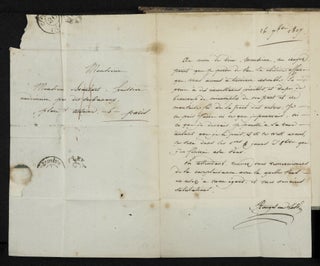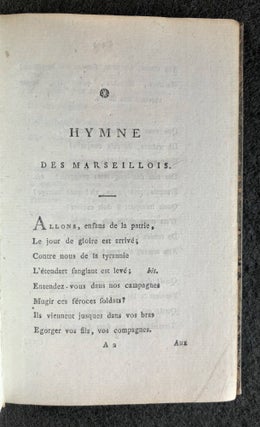Chansons Patriotiques. Nouvelle Edition. Dord [Dordrecht]: B. F. Morks, 1795.
With: an autograph letter signed by Rouget de Lisle.
8vo (159 x 99 mm). 136 pp. Half-title, engraved title with revolutionary emblems. Very good, 2 or 3 marginal tears. Hand-colored etching of a Revolutionary tribunal cut round and mounted on front flyleaf. Modern marbled boards, preserving earlier gilt leather lettering-piece on backstrip (head of spine and joints neatly restored). Deckle edges. Tipped onto lower flyleaf is an ALS by Rouget de Lisle, dated 26 September 1827, signed in full Rouget de Lisle, one page, 8vo, with integral address leaf and postal inkstamp (trace of wax seal, small marginal loss to corner of address leaf).
Rare Dutch edition of 38 French Revolutionary lyrics, opening with Rouget de Lisle’s “Hymne des Marseillois,” named the national anthem at around the time this collection was printed; with a tipped-in autograph letter signed by its author.
Originally titled Chant de guerre pour l'Armée du Rhin, the immortal song, emblematic of Revolutionary ardor, was written, ironically, by a Royalist. An army engineer with the rank of captain, Rouget de Lisle, composer and poet, wrote the song in April 1792, while garrisoned at Strassburg, at the request of the local mayor, Philippe-Frédéric de Dietrich, who was the first to perform the song publicly, in his own salon. Whether Rouget de Lisle wrote the music as well as the lyrics is still disputed. He was rewarded for his labors by being temporarily stripped of his rank for having objected to the imprisonment of Louis XVI in August 1792; rehabilitated, as the army needed engineers, he himself was imprisoned during the Terror. Although the Marseillaise was decreed the national anthem on July 14, 1795, its author spent much of his later years in poverty, until at the age of 70 he was granted a pension by Louis-Philippe, six years before his death.
Most of the songs in the collection supply the name of the popular tune to which they are to be sung. Included are the rare Hymne La Varseillois (Chanté sur différents Théatres, paroles du C. Delrieu, musique du C. Girout);[Méhul and Chenier’s] Chant du Départ, Hymne de Guerre, by “a Representative of the People,” named an official anthem by Napoleon in 1804; the popular and brutal Carmagnole des Royalistes, a song which long outlived the Terror; the awkwardly titled Couplets sur le danger de la patrie dans la nuit du 9 au 10 Thermidor; a Chanson Bachique et Patriotique, and various other chants patriotiques or civiques. OCLC lists 5 copies, all in Holland. Not in Pierre, Les Hymnes et Chansons de la Révolution.
Addressed to a Monsieur [Sautant?], a court usher (huissier audiencier pres des tribunaux) in Paris, the letter from Rouget de Lisle is an apology for neglecting a certain “trivial affair” which must be concluded with the addressee. He begs the huissier not to think that he has forgotten: "Victim of a difficult situation, duped by his own miscalculations and by the dishonesty of others," he cannot at present proceed, but hopes to do so during the first week of October (Au nom de dieu Monsieur, ne croyez point que je perde de vue la chétive affaire que nous avons à terminer ensemble. En proie à des circonstances pénibles, et dupe de beaucoup de mécomptes de ma part et de mauvaise foi de la part des autres, je ne puis faire ni ce que je pourrais, ni ce que je devrais. Je pousse à la [?] autant que je le puis, et, si ce n’est avant, ce sera dans les 1ers 8 jours d’8bre que j’en finirai avec vous.)
Price: $1,800.00



